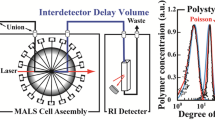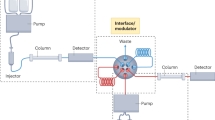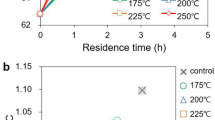Abstract
WHEN information concerning the structure of substances is required from paper Chromatographic data, R M values are used rather than R F as they are more directly related to the different groups of which the molecules of these substances are composed1. In cases when one phase forming the Chromatographic system is composed of two solvents practically immiscible with the other liquid phase, at any proportion of the component solvents (for example, hexane + chloroform/water; hexane/water + di-methylsulphoxide) and assuming that chromatography is a true counter-current extraction process, following the plate theory, a simple equation can be derived relating the R M value to the composition of the two-component phase.
This is a preview of subscription content, access via your institution
Access options
Subscribe to this journal
Receive 51 print issues and online access
$199.00 per year
only $3.90 per issue
Buy this article
- Purchase on Springer Link
- Instant access to full article PDF
Prices may be subject to local taxes which are calculated during checkout
Similar content being viewed by others
References
Bate-Smith, E. C., and Westall, R. G., Biochim. Biophys. Acta, 4, 427 (1950).
Kemula, W., and Buchowski, H., Roczn. Chem., 29, 718 (1955).
Soczewiński, E., and Wachtmeister, C. A. (in preparation).
Author information
Authors and Affiliations
Rights and permissions
About this article
Cite this article
SOCZEWIŃSKI, E. R M and Solvent Composition in Paper Chromatograph. Nature 191, 68–69 (1961). https://doi.org/10.1038/191068a0
Issue Date:
DOI: https://doi.org/10.1038/191068a0
Comments
By submitting a comment you agree to abide by our Terms and Community Guidelines. If you find something abusive or that does not comply with our terms or guidelines please flag it as inappropriate.



